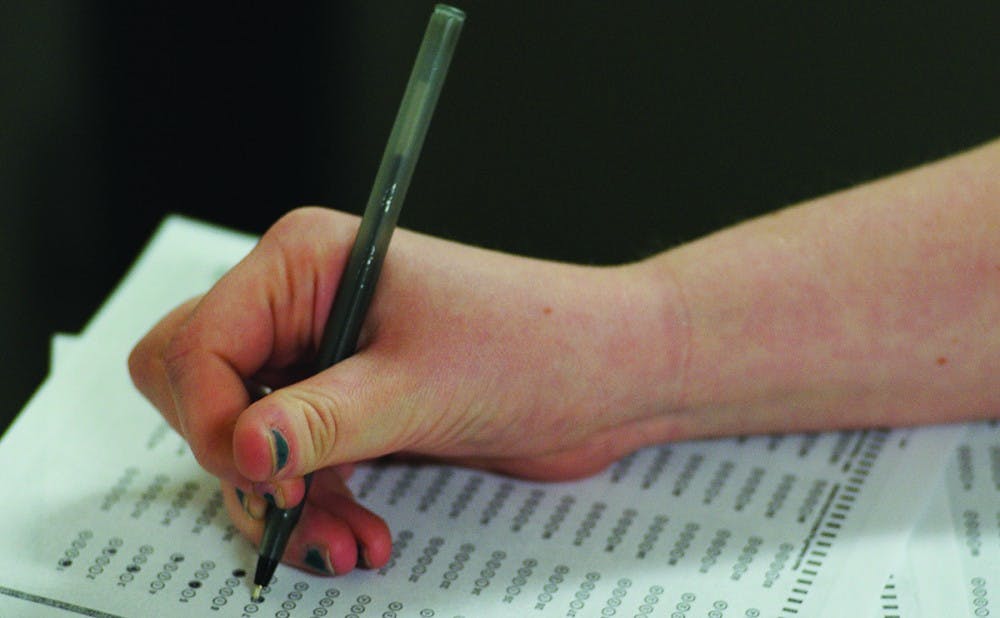The College Board announced major changes to the SAT March 5, which have received mixed reviews from leaders in the Duke community.
College Board said the changes are meant to better test college preparedness. The alterations include making the writing portion of the exam optional, administering the exam via computer and eliminating "SAT words" in favor of using words heard on a more regular basis, among other things. Additionally, points will no longer be deducted for incorrect answers. The changes will be unveiled spring 2016 and will return the exam to a 1600-point scale.
Dean of Undergraduate Admissions Christoph Guttentag called the changes “promising,” but said that the University’s admissions process will not be greatly affected.
“It will be useful in terms of placing other academic accomplishments into a context,” Guttentag said. “We will continue to find the subject tests useful, to find the ACT useful, to find the AP exam scores useful. I think that it will be a better exam for students and an equally useful exam.”
Predicting 'university-level success'
Currently, the Duke admissions process takes into account six factors, among which standardized test scores is one, Guttentag said. In the early stages of evaluation, each of the six factors are given equal weight to distinguish between stronger and weaker applicants, but different factors gain different levels of significance when specific decisions are made. Depending on the applicant, SAT and ACT scores can have varying implications.
“It’s not just what they’ve done—it’s what they’ve done within the context of what was available to them,” Guttentag said. “When you try to answer those questions, it becomes very contextual. Depending on their backgrounds and how they grew up, those scores can have different meanings.”
Although the weight given to testing scores can vary between applicant to applicant, SAT and ACT scores are never overemphasized by admissions, Guttentag said.
Kristen Stephens, an associate professor of the practice of education, said she was concerned that the SAT would continue to under-predict for certain students.
“Some of these tests, you have to process information really quickly,” Stephens said. “Gifted students tend to have a slower processing speed, because they think very deeply about the questions. They take simple questions and make them more complicated.”
Although the College Board’s efforts merit praise, whether the changes will be adequate remains to be seen, wrote Kate Allman, professor of education, in an email Tuesday.
Ideally, the changes would bring the SAT into better alignment with students’ high school work, wrote Stephen Farmer, vice provost for enrollment and undergraduate admissions at the University of North Carolina Chapel Hill, in an email Monday.
“If the test is now better aligned with the things students are learning in school, any good test-prep program should help the students not only get ready for the SAT but also learn something that will be more important for them than their test score,” Farmer said.
Allman expressed hope that the recent attention directed toward the SAT would encourage universities to reevaluate their goals for higher education.
“I think that these changes, more importantly, beg questions that institutes of higher education must consistently revisit: how do we define success at the university level?” Allman said. “And how does our answer to this question help us choose effective and equitable tools for predicting university-level success?”
College Board announced the changes one month after a study led by William Hiss, former dean of admissions at Bates College, indicated that there was nearly no difference in college academic performance between students that submitted SAT or ACT testing scores and students that did not. Hiss’s report also revealed that high school GPA was the better indicator of college performance.
“The question is: by how many students are colleges truncating their pools through testing?” Hiss said. “Maybe 30 percent.”
Hiss recommended that colleges make submission of SAT and ACT scores optional rather than eliminate the use of standardized testing entirely.
“I would have every confidence that an institution like Duke would read very, very carefully students with enormous promise, even if they did not show promise in test scores,” Hiss said.
Online preparation
In addition to changes to the actual test, the College Board announced a new partnership with the non-profit educational organization Khan Academy and college application fee waivers, limited to four colleges, for low-income students.
As part of its new collaboration with College Board, Khan Academy will be providing free online test preparation materials, including 200 videos that cover SAT-related topics.
Bob Schaeffer, public education director of Fair Test—the National Center for Fair and Open Testing, called the new SAT model “cosmetic surgery” and said the changes did not address the test’s fundamental weaknesses. He stressed that providing online test preparation did not make up for testing disparities due to income equality.
“The problem is not the availability of free test prep,” Schaefer said. “The problem is that students whose families have the resources buy them the equivalent of test prep steroids."
Shahar Link, the founder of Mindspire—a SAT and ACT test preparation center in the Triangle area—said online videos were “supplementary materials” and could not substitute tutoring.
“Students don’t really like to watch videos of people doing math problems—in fact, it’s torturous,” Link said. “What a tutor does is make the interaction more lively. That can't be replaced by Khan Academy.”
Link noted that online test preparation would likely only benefit a small portion of the student population.
“It can address some of the inequality issues—for a very motivated student,” Link said. “But that’s a small proportion of the overall population.”
Correction: This article has been updated to reflect that Guttentag is dean and not director of undergraduate admissions.
Get The Chronicle straight to your inbox
Signup for our weekly newsletter. Cancel at any time.

